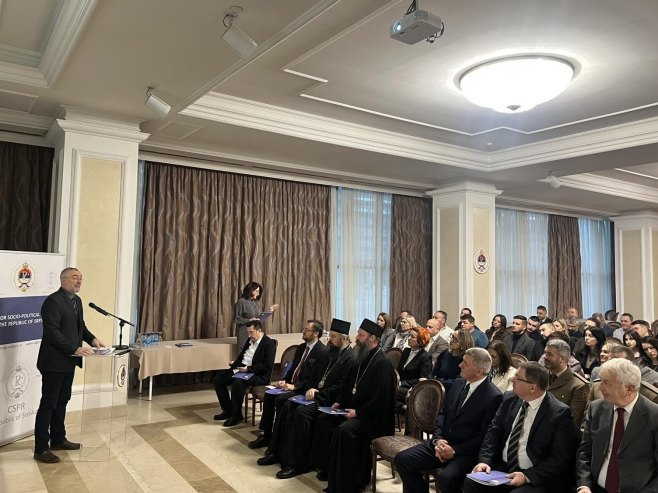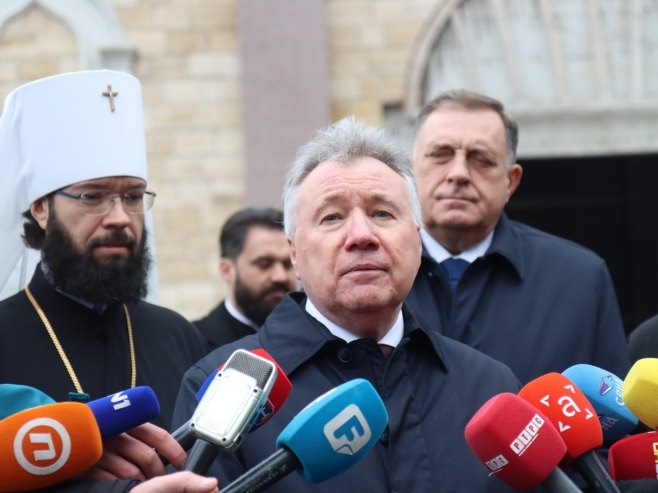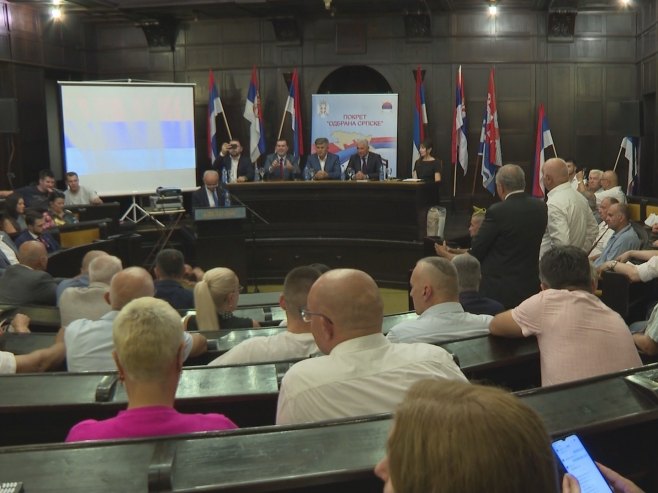Accepting that a foreigner without a mandate under Annex 10 of the Dayton Agreement, as well as a crippled Constitutional Court of BiH without judges from Republika Srpska, make decisions that directly violate international law reflects the subservient mentality of Muslim-Bosniak politics. As Dino Konaković famously said: “Tie the horse where the master tells you.” This time, we address the OHR, and another time we will address the Constitutional Court of BiH.
It is sufficient to summarize in ten points what the OHR does beyond the Dayton Agreement and against peace in BiH:
- According to Article 1.2 of Annex 10 of the Dayton Agreement, the High Representative is appointed at the request of the signatory parties (Republika Srpska, the Federation of BiH, Serbia, Croatia, the former “Republic of BiH”), and then confirmed by the UN Security Council. The appointment of Christian Schmidt was not requested by any signatory party, and Republika Srpska explicitly decided by the conclusions of the National Assembly of Republika Srpska on March 10, 2021, that it “cannot accept the imposition of any person as High Representative.” The UN Security Council considered the possibility of appointing Christian Schmidt as High Representative on July 22, 2021, but it was rejected, as only two out of 15 members voted in favor, while 13 votes were abstentions. Unlike Schmidt, all previous High Representatives were confirmed by the UN Security Council.
- By signing Annex 10, the signatory parties accepted that the High Representative (in singular) “would help the parties mobilize and, as needed, coordinate the activities of the organizations and agencies involved in the civilian aspects of the peace settlement,” not to be their commander or protector.
- The signatory parties, in Annex 10, Article 2, defined the tasks of the High Representative to “monitor the implementation of the peace settlement; maintain close contact with the parties, coordinate the activities of civilian organizations and agencies in BiH, etc.” The High Representative did not receive any executive or commanding powers, nor judicial, nor legislative.
- The self-proclaimed so-called “Peace Implementation Council” (PIC) is not an organ under the Dayton Agreement and has no authority in implementing the peace settlement, so it neither gave nor could give any additional “Bonn powers” to the High Representative.
- At the session held in Bonn, Germany, on December 9/10, 1997, the PIC, in its communiqué – point 11.2. noted: “The Council welcomes the High Representative’s intention to use his final authority regarding the interpretation of Annex 10 to facilitate the resolution of difficulties by making binding decisions, as he judges necessary,” and in point b) it states: “interim measures to take effect when the parties are unable to reach agreement and which remain in force until the Presidency or the Council of Ministers adopts a decision on the issue concerned in accordance with the Peace Agreement.” This “welcoming of intention” is not an authorization. Even if it were, it pertains exclusively to acts within the jurisdiction of the Presidency of BiH and the Council of Ministers, and not to acts within the jurisdiction of the Parliamentary Assembly as a legislative body at the BiH level.
- Any intrusion, even temporary, into the legislative jurisdiction in BiH was not on the agenda of the Bonn session of the PIC. The non-consensual PIC members were aware that “welcoming the intention” to pass laws would be a gross violation of the international agreement, which could lead to the collapse of the entire structure of the Dayton Agreement. Imposing laws through a decision by the High Representative is not an “issue explained by the Peace Implementation Council in Bonn on December 9 and 10, 1997,” as the formulas used by the High Representatives for imposing laws suggest. The OHR, which according to Annex 10 is merely an office, an administrative service, officials, staff that assist the High Representative in performing their duties, fabricated a gross falsification by adding point 11.2.b) of the Bonn conclusions with an invention that states: “One of the most important events in the peace implementation process was the PIC meeting in Bonn in December 1997. Elaborating on Annex 10 of the Dayton Peace Agreement, the PIC requested the High Representative to dismiss officials who violate legal obligations and the Dayton Peace Agreement and to impose crucial laws if they are not adopted by the legislative bodies of Bosnia and Herzegovina.” This falsification is still present on the OHR’s website (https://www.ohr.int/o-ohr-ima/ohr-mandat/). There was no “elaboration” of Annex 10 of the Dayton Agreement, as the PIC is not a signatory party, nor any organ under the Dayton Agreement, so it has no authority under that agreement or under international law to elaborate on an international treaty that it did not sign.
- All laws “imposed” by the High Representative, citing point 11.2 of the “Bonn conclusions of the PIC” as the legal basis, do not include “legislative activity” by the High Representative. Furthermore, in all cases of imposing laws by a decision of the High Representative, there is a formula: “The law that follows and is an integral part of this decision shall enter into force on a provisional basis until the Parliamentary Assembly of Bosnia and Herzegovina adopts it in the same form, without amendments and without additional conditions.” When the Parliamentary Assembly subsequently adopted the imposed laws under pressure, blackmail, deceptions, and frauds, it could not be valid, as the High Representative, according to the rules of procedure of both houses of the Parliamentary Assembly, is not an authorized proposer for passing laws. Due to such a significant procedural error, such laws could not become valid, but are considered NULL AND VOID. Even when the High Representative issued a decision to amend an existing law, they were not amended due to the formula in the decisions of the High Representative: “The law that follows and is an integral part of this decision.” Therefore, it did not become an integral part of the existing law, as confirmed by any linguistic and logical interpretation.
- Considering the falsification and fabrication in the added text on the OHR’s website that the High Representative “when deemed necessary, imposes crucial laws if they are not adopted by the legislative bodies of Bosnia and Herzegovina,” then it means that even by this falsification, the illegal Schmidt could not have “imposed” the Law on Amendments to the Criminal Code of Bosnia and Herzegovina from July 1, 2023. Firstly, because this “Schmidt’s law” is not one of the “crucial laws”; secondly, the “legislative bodies of BiH” did not previously consider it, so they could not have adopted it. Thus, this “authority” by the added Bonn conclusions falls as well. Schmidt added Article 203.a) to the Criminal Code of BiH: “Non-implementation of the High Representative’s decisions” with the “legal consequence of the conviction: a) termination of official duties and employment; b) revocation of decorations; c) prohibition of performing official duties in the legislative, executive, judicial, administrative, or any other body financed entirely or partially from public funds; and d) prohibition of acquiring official duties in the legislative, executive, judicial, administrative, or any other body financed entirely or partially from public funds.” Schmidt thus confirms his adherence to Nazi traditions.
- Schmidt could not have made a decision bringing the Law on Amendments to the Election Law of Bosnia and Herzegovina because the House of Peoples of the Parliamentary Assembly at the BiH level did not even discuss, thus did not reject, the amendments to the Election Law of BiH previously adopted by the House of Representatives. Namely, four out of five Bosniak delegates, led by Šefik Džaferović, left the House of Peoples session scheduled for March 18, 2024, according to an agreement with the OHR, to give Christian Schmidt an opportunity to impose the election law. An even greater mockery of the “state of BiH” and its legal system was made by the OHR by issuing a “correction of the High Representative’s decision” supposedly bringing amendments to the Election Law of BiH. The correction does not pertain to the election law but to the members of the election commission cobbled together based on party affiliation – SDA, SDS, PDP, DF. Thus, Schmidt, correcting the non-existent part of his law called a decision, “prohibited” them from retiring. All these absurdities are regularly published by the “state” Official Gazette of BiH, unlike Republika Srpska, which refuses to publish them in accordance with the law.
- The adoption of decisions by a criminal saboteur corrupted by a high salary he never had nor could have, who was not appointed by the will of the signatory parties to Annex 10 of the Dayton Agreement nor confirmed by the UN Security Council, is a gross violation of the international Dayton agreement, contrary to the rule of law, degrading for the so-called “state of BiH,” and far more for all those who support Christian Schmidt’s actions. I am referring to the foreign factor, as Bosniak politicians still hope that foreigners will create a unitary state tailored only to one nation, while the Serbs…
Source: Glas Srpske









